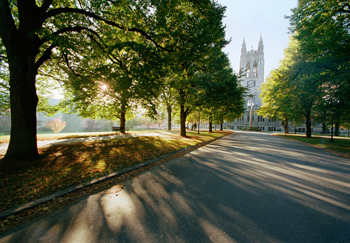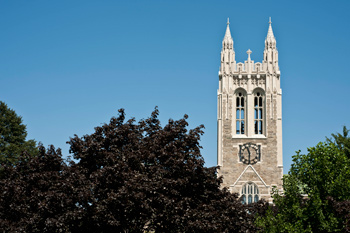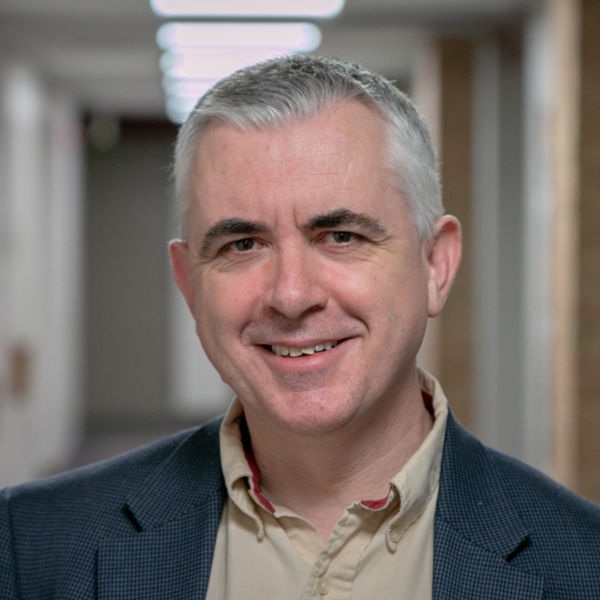Marina Pastrana was an accounting major at Boston College when she decided to go on a service-learning trip to Nicaragua.
Her experience turned out to be more than just a summer diversion. She participated in the Arrupe International Program, which sends students to Latin America to experience and reflect upon poverty firsthand, witness the diversity of God’s creation and offer their abilities in creating a more just world. Participants meet weekly to learn about the country they will visit and to reflect on why they have chosen to join the group.
“It was my first close interaction with the Jesuits,” said Pastrana, who was raised Catholic. “I began to learn the Ignatian model of reflection, and to pursue a faith that does justice and seeks action.”
It changed her life.
“I asked myself, why am I doing what I’m doing? Is accounting something that will bring me joy?” she said.
This kind of experience is at the heart of the Boston College education. It’s a school that has retained its religious identity in a city full of colleges where faith has faded in importance.
The Rev. Jack Butler, mission and ministry vice president at Boston College, is responsible for helping the school maintain, articulate and institutionalize its Jesuit identity.
“What makes us different is that we still operate out of our faith,” Butler said.
The Jesuit lens through which the college views its mission makes a difference in how the school forms its campus community and how it trains people to engage the world.
Butler said students are given an opportunity to explore three questions: “What gives you joy? What are you good at? What does the world need?”
Boston College, Butler said, is not neutral on how students live their lives.
“We offer value-based, value-laden education. We believe in justice, mercy and communal religious celebrations,” he said.
Questions to consider
Questions to consider:
- A Jesuit approach to education engages not just the head with information but the heart with formation. How would a similar approach to education affect how you teach within your organization?
- The Rev. Jack Butler says Boston College is “making our statement of faith by creating these institutions.” How is your institution a statement of faith? What does your institution show that you believe?
- John Hardt worries that Jesuit identity could “slip into” an “easy tolerance” far different from the diversity it is trying to promote. What’s the difference between tolerance and diversity? Why would one be better than another for your organization?
- What would it mean to lead your organization with an air of “anticipatory joy”?
The Jesuit tradition
In the Jesuit tradition, it is not enough to be a well-educated human being, said John Hardt, assistant to the president for mission and identity and an assistant professor in the department of medicine at Loyola University Chicago.
“Education is for compassion and awareness of human suffering, so that one’s life is forever changed by those encounters,” he said. “One has to enter the world to understand the world.”
And Jesuit philosophy fits university life as well, said the Rev. Charles Currie, president of the Association of Jesuit Colleges and Universities.
“It is the constant interplay of experience, reflection and decision. Then you repeat the process. This is good pedagogy.”
This method, first developed by the founder of the Jesuit order, Ignatius Loyola, informs education at all 28 U.S. Jesuit colleges and universities. More than 200,000 students are enrolled in Jesuit schools in the United States, which include Georgetown University and Saint Louis University. Loyola University Chicago, the largest Jesuit school, has nearly 16,000 students, while Wheeling Jesuit University, the smallest, has just more than 1,400.
They all share roots in the Society of Jesus, a tradition set within the Roman Catholic faith. To understand what Jesuit education means, Butler said, one must see it in the light of Catholic education, which is built on three principles.
The first of these is that creation is good and worthy of study. Second, creation has a purpose, and those engaged in the intellectual life do so with a sense of meaning. And finally, Catholic education is Trinitarian, so “Catholic education fosters relationships and forms community,” said Butler.
For students at Boston College, the opportunities include the Arrupe International Program, as well as retreats, local Boston service opportunities and other programs to help students identify how God has called them to put their faith into action. The Intersections program offers credit for students who attend a weekly seminar that explores the transition from college to life outside the campus bubble.
“It’s a part of who Boston College is,” Butler said. “That’s driven by our philosophy. Instead of doing it in the abstract, we send you to the soup kitchen.”
But once students have that experience, they are then expected to reflect on it and learn from it, Butler said. “Ignatian education is to be attentive, to be reflective, and to be loving. You can’t say you love without doing anything.”
Institutionalizing the mission
Infusing the entire institution with these principles requires intention and effort on the part of its leaders.
While both Loyola and Boston College hire faculty who are not Jesuit or even Christian, Hardt believes that the classroom and the curriculum should reinforce the school’s identity, so that it is not relegated to an extracurricular activity.
“We can slip into a way of being in which we think our identity exists in our campus ministry and its liturgical life, but not at the heart of our intellectual life,” Hardt said.
Loyola has produced a paper, “ Transformative Education in the Jesuit Tradition,” that all job applicants receive; faculty must write a response to it.
“If we’re serious,” Hardt said, “we won’t be a university that everyone wants to teach at.”
In fact, Loyola expects that “faculty researchers should be willing and able to articulate how their work elaborates upon the Catholic tradition and how it contributes to the common good,” according to the document.
Efforts to define and implement this faith identity have been resurgent in Jesuit schools over the last 20 years, said Currie.
“I’ve seen these efforts increase in sophistication,” he said. “Twenty years ago, they were very primitive.” Over the last 50 years, a number of Jesuit schools had grown tremendously, but by the 1970s many people wondered if the schools had lost their identity.
And indeed, attempts to better define and institute religious identity are not unique to Jesuit schools, Currie said. “All religious schools are talking about rediscovering their identity. And we’re borrowing from one another and helping one another.”
At Loyola, the “Transformative Education” document describes the goal of Jesuit education on its campus, which is to provide an education that empowers and transforms students in a manner that is adapted to today’s world. But, as it says, “transformative education is not simply a content; it is also a method.”
This method of education does not seek to pour information into the minds of students waiting to receive it.
“An Ignatian pedagogy is one in which the student is challenged to appropriate his or her own process of knowing,” according to “Transformative Education.”
As Pastrana discovered on her summer trip to Nicaragua, Jesuit education involves paying attention to one’s experience, reflecting on it, making a judgment on one’s answer to a question or problem, and finally putting that judgment into action in real life.
By integrating this identity into the heart of the university, Loyola, Boston College and other Jesuit schools hope to see students engaged in the world and able change it.
“We want to give God greater glory by manifesting what it means to be a person fully alive,” Butler said. “We believe in God, in Jesus, but it’s not just for Catholics. We think this is of value; it makes the world a better place. We are making our statement of faith by creating these institutions.”
Diversity of expression
Those institutions are formed by and committed to the Jesuit tradition, but that does not exclude other faiths.
Roughly 55 percent of students at Jesuit institutions consider themselves to be Catholic, while another 16 percent are other Christians. Nearly one third of students at Jesuit schools are Jews, Muslims or other faiths, or declare no faith at all.
Loyola University Chicago embodies this diversity. Set in a multiethnic and religiously mixed community, Loyola has sought to bring its core Catholic identity into dialogue with the many other perspectives on campus.
“Our style of education is not exclusionary,” Hardt said. “If we take the grandeur of God seriously, we have to appreciate that we’ll know more about God through encounters with people of divergent traditions and beliefs.”
Encountering cultures from a number of continents since its beginning has given the Jesuit order a greater sense for the diversity of God’s creation. Boston College doesn’t value diversity only out of belief in equality, Butler said. “For us, it also reflects the image of God and how God is sacramentalized in the world.”
The difficulty, Hardt said, is not that this diversity will dilute his school’s Jesuit Catholic identity. Rather, the challenge is to avoid the slip into easy tolerance in which different communities exist side by side peacefully but without interaction. That’s not diversity at all, Hardt said.
If we allow that to happen, he said, “we’re missing a chance for education. Our diversity should be rich, alive and articulated so we’re having these conversations.”
Because the school is confidently communicating its identity, it can host a “dialogue as diverse as the students and staff that occupy the place,” Hardt said, making Loyola a place where people from all perspectives “are supported and challenged and able to grow in their commitments because we take ours so seriously.”
That commitment to engaging with the wider culture altered the course of Marina Pastrana’s life: As a result of her trip to Nicaragua, she decided to add a minor in Latin American studies. She then led an Arrupe trip to El Salvador, and upon graduation, she began a master’s degree program in theological studies. Pastrana is now hoping to land a position working with low-income families. She credits Boston College for creating an environment where she could make such life-changing discoveries about who she is.
“I’m not sure I would have taken the same path at another school,” she said. “From the moment you step on campus, there’s a sense of discovering who you are and what you want to do with life.” As a result, she said, “the opportunities for a moment like I had are so vast.”
















